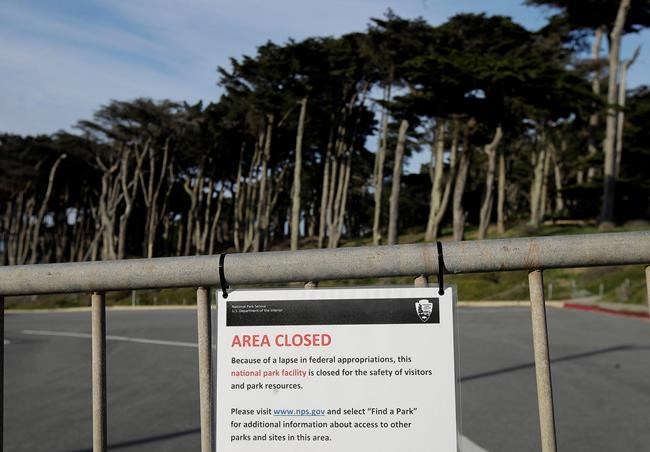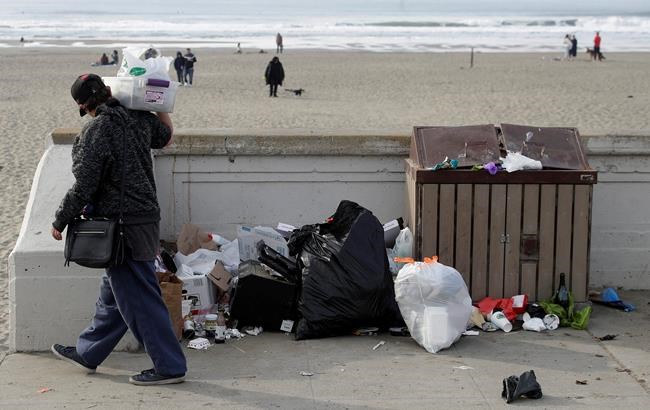National parks struggle to stay open, safe during shutdown
Advertisement
Read this article for free:
or
Already have an account? Log in here »
To continue reading, please subscribe:
Monthly Digital Subscription
$1 per week for 24 weeks*
- Enjoy unlimited reading on winnipegfreepress.com
- Read the E-Edition, our digital replica newspaper
- Access News Break, our award-winning app
- Play interactive puzzles
*Billed as $4 plus GST every four weeks. Offer only available to new and qualified returning subscribers. Cancel any time.
Read unlimited articles for free today:
or
Already have an account? Log in here »
Hey there, time traveller!
This article was published 05/01/2019 (2250 days ago), so information in it may no longer be current.
Nonprofits, businesses and state governments nationwide are putting up money and volunteer hours in a battle to keep national parks safe and clean for visitors as the partial U.S. government shutdown lingers.
But such makeshift arrangements haven’t prevented some parks from closing and others from being inundated with trash. Support groups say donations of money and time could run short if the budget impasse between President Donald Trump and congressional Democrats lasts much longer. Some are calling for parks to close for the duration of the standoff, which Trump said Friday could last “months or even years.”
“Our national parks deserve better than an improvised patchwork of emergency care,” Diane Regas, CEO of the Trust for Public Lands, said in a letter to Trump that noted reports of theft, poaching and accumulating piles of garbage and human waste. “They need robust funding and full-time protection, or they should be closed.”

Ryan Zinke, who recently stepped down under fire as Interior Department secretary, had ordered many national parks to stay open, saying visitors should not be penalized for the political feud over a border wall with Mexico. During an interview with The Associated Press, Zinke said visitors should take action to keep parks clean.
“Grab a trash bag and take some trash out with you,” he said. “In order to keep them open, everybody has to pitch in.”
The park service has reached deals with more than 60 partner groups, concessionaires and states to handle trash removal, restroom cleanup and other basic tasks at more than 40 parks — and, in a few cases, to keep park staffers on the job, spokesman Jeremy Barnum said Friday.
The state of New York was footing the bill to operate the Statue of Liberty-Ellis Island National Monument, while a private company donated portable toilets at several locations on the National Mall in Washington, D.C. The National Park Foundation took charge of repairing and operating the National Christmas Tree.
Another non-profit donated more than $50,000 to keep 15 rangers temporarily on the job at Great Smoky Mountains National Park in Tennessee and North Carolina.
At Joshua Tree National Park in Southern California, volunteers have hauled away garbage, cleaned restrooms and restocked them with toilet paper, said John Lauretig, executive director of Friends of Joshua Tree.
“We’ve been dubbed the ‘Toilet Paper Angels,'” he said.
Yosemite National Park in California reported Friday that a man died after falling into a river on Christmas Day, and a spokesman said a statement was not issued more promptly and the investigation is taking longer than usual because of the shutdown.
People living near Yosemite have organized work crews, while businesses in neighbouring towns are offering incentives for visitors to remove their rubbish.
The Rush Creek Lodge in Groveland gave a complimentary coffee, cocktail or dessert to all bringing a full trash bag from the park. Spokeswoman Teri Marshall said the lodge was trying to devise a slogan for the promotion.
“‘Turning garbage into goodies’ is where I think I might be hanging our hat,” Marshall said.
People visiting Yosemite on Saturday will be receiving garbage bags and tips on how best to use the park during the shutdown, courtesy of the Tuolumne County Visitors’ Bureau. One recommendation: “Go before you go,” a reference to the limited number of open bathrooms, executive director Lisa Mayo said.
Grand Canyon National Park is open with help from Arizona, which was paying about $64,000 a week to cover restroom cleaning, trash removal and snow plowing. Anyone with permits to hike in the backcountry or raft on the Colorado River could go, but the park wasn’t issuing new permits, spokeswoman Emily Davis said.
Utah chipped in about $7,500 a day from Dec. 22 to 31 to keep Zion, Bryce Canyon and Arches national parks running. Since then, the non-profit Zion Forever Project has committed $16,000 to keep a skeleton crew on hand and the bathrooms and visitor centre open at Zion, which was drawing several thousand people a day, executive director Lyman Hafen said.
“It’s extremely demoralizing for the park service folks who want to be doing their job and caring for the park the way they do,” Hafen said.

Three Republican congressmen from Utah — Chris Stewart, Rob Bishop and John Curtis — sent a letter Friday to Acting Interior Secretary David Bernhardt asking him to take emergency measures to restart regular operations at the state’s five major national parks.
Friends of Hawaii Volcanoes National Park raised $114,000 to keep the park for open for nine days with limited service, executive director Elizabeth Fien said. The money was used to pay law enforcement staff and rangers, including one who monitors endangered nene, or Hawaiian goose.
The Death Valley Natural History Association said it would pay to keep the visitor centre at Death Valley National Park open until at least Thursday. Winter is a busy time at the park straddling the California-Nevada line, drawing visitors to its salt flats, dunes and canyons when the usual scorching temperatures are at bay.
A support group for Sleeping Bear Dunes National Lakeshore in northern Michigan was cleaning toilets and grooming a popular trail for cross-country skiing and snowshoeing. But snow-covered parking lots weren’t plowed, and the visitors centre near Lake Michigan was closed, leaving the volunteer group to consider putting up an information tent.
“A lot of people who go to the park are looking for advice about where to go — what areas are good for snowshoeing and which might be dangerous, and there’s no one here to tell them,” said Kerry Kelly, the group’s chairman. “It’s extremely frustrating.”
Another non-profit was paying a private company to clean portable toilets near two popular trailheads at Shenandoah National Park, which includes a 101-mile (163-kilometre) section of the Appalachian Trail.
Some parks have closed, including Arches and Canyonlands in Utah, where a snowstorm made roads impassable. Park officials posted on Twitter that the shutdown left no money for snowplowing. In California, Sequoia and Kings Canyon National Park has closed and Muir Woods National Monument will shut down Monday because of overflowing trash and human waste.
At the Loxahatchee National Wildlife Refuge in Florida’s Everglades, no rangers were available to empty a metal tube where visitors deposit $5 entry fees on the honour system. After a canoe rental company notified authorities, officers with the U.S. Fish and Wildlife Service emptied the cash box and were monitoring it as part of their limited operations.
Conservation groups warned that volunteers could provide only a minimum level of service. Without full-time, professional staffing, natural resources and cultural artifacts could be damaged and people could be injured, they said.
“The political pressure to keep the parks open needs to come off so managers can evaluate what they’re capable of protecting and whether they can keep visitors safe,” said Kristen Brengel, vice-president of government affairs for the National Parks Conservation Association.
___
McCombs reported from Salt Lake City and Flesher from Traverse City, Michigan. Associated Press writers Matthew Brown in Billings, Montana; Felicia Fonseca in Flagstaff, Arizona; Krysta Fauria in Los Angeles; Jocelyn Gecker in San Francisco; Audrey McAvoy in Honolulu; Jonathan Matisse in Nashville, Tennessee; Denise Lavoie in Richmond, Virginia; and Jennifer Kay in Miami contributed.


